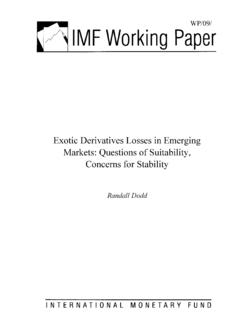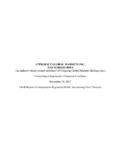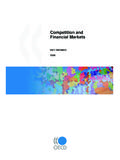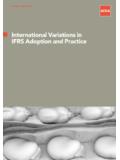Transcription of CHILE REVIEW OF THE FINANCIAL SYSTEM - OECD.org
1 CHILE REVIEW OF THE FINANCIAL SYSTEM October 2011 ORGANISATION FOR ECONOMIC CO-OPERATION AND DEVELOPMENT The OECD is a unique forum where governments work together to address the economic, social and environmental challenges of globalisation. The OECD is also at the forefront of efforts to understand and to help governments respond to new developments and concerns, such as corporate governance, the information economy and the challenges of an ageing population. The Organisation provides a setting where governments can compare policy experiences, seek answers to common problems, identify good practice and work to co-ordinate domestic and international policies. The OECD member countries are: Australia, Austria, Belgium, Canada, CHILE , the Czech Republic, Denmark, Estonia, Finland, France, Germany, Greece, Hungary, Iceland, Ireland, Israel, Italy, Japan, Korea, Luxembourg, Mexico, the Netherlands, New Zealand, Norway, Poland, Portugal, the Slovak Republic, Slovenia, Spain, Sweden, Switzerland, Turkey, the United Kingdom and the United States.
2 The European Union takes part in the work of the OECD. OECD Publishing disseminates widely the results of the Organisation s statistics gathering and research on economic, social and environmental issues, as well as the conventions, guidelines and standards agreed by its members. This document and any map included herein are without prejudice to the status of or sovereignty over any territory, to the delimitation of international frontiers and boundaries and to the name of any territory, city or area. Ce document et toute carte qu'il peut comprendre ne pr jugent en rien du statut de tout territoire, de la souverainet s exer ant sur ce dernier, du trac des fronti res et limites internationales, et du nom de tout territoire, ville ou r gion. CHILE : REVIEW OF THE FINANCIAL SYSTEM OECD 2011 3 FOREWORD This REVIEW of CHILE by the Committee on FINANCIAL Markets (CMF) was prepared as part of the process of CHILE s accession to OECD membership.
3 The OECD Council decided to open accession discussions with CHILE on 16 May 2007 and an Accession Roadmap, setting out the terms, conditions and process for accession, was adopted on 30 November 2007. In the Roadmap, the Council requested a number of OECD Committees to provide it with a formal opinion. In light of the formal opinions received from OECD Committees and other relevant information, the OECD Council decided to invite CHILE to become a Member of the Organisation on 15 December 2009. After completion of its internal procedures, CHILE became an OECD Member on 7 May 2010. The CMF was requested to REVIEW CHILE s FINANCIAL SYSTEM , including its market and regulatory structure, to assess whether it is market-oriented and sufficiently open, efficient and sound, based on high standards of transparency, confidence and integrity, for CHILE to be able to accept the requirements of membership in the area of FINANCIAL markets.
4 The present report was finalised on the basis of information available in September 2009. It is released on the responsibility of the Secretary General of the OECD. CHILE : REVIEW OF THE FINANCIAL SYSTEM OECD 2011 5 TABLE OF CONTENTS LIST OF ABBREVIATIONS .. 7 I. INTRODUCTION AND OVERVIEW .. 9 A. Macroeconomic Context .. 9 B. Recent Trends in FINANCIAL Markets .. 10 C. Summary .. 10 II. CHILE S FINANCIAL SYSTEM IN A LONG-TERM PERSPECTIVE .. 12 III. FINANCIAL INFRASTRUCTURE .. 15 A. Central Bank and Monetary Policy Framework .. 15 B. Payments SYSTEM .. 18 IV. STRUCTURE AND OPERATION OF THE FINANCIAL SYSTEM : BANKING SYSTEM .. 20 V. STRUCTURE AND OPERATION OF THE FINANCIAL SYSTEM : CAPITAL MARKETS .. 26 A. Capital Market Intermediaries .. 26 B. Fixed-Income Market .. 26 C. Equity Market .. 28 D. Pension funds .. 33 E. Commodities exchanges .. 33 VI. FINANCIAL SUPERVISION AND REGULATION.
5 34 A. Supervision of Markets and Intermediaries .. 34 B. FINANCIAL Stability Oversight and Macro-Prudential Surveillance .. 43 C. FINANCIAL SYSTEM support measures .. 43 D. International Surveillance Assessment of Chilean FINANCIAL Supervision .. 44 VII. INTERNATIONAL FINANCIAL INTEGRATION AND MARKET ACCESS .. 45 A. Recent Developments in Cross-border Investment .. 45 B. Internationalisation and Capital Market Regulation .. 45 VIII. COMPLIANCE WITH THE OECD LEGAL INSTRUMENTS ON FINANCIAL MARKETS .. 52 REFERENCES .. 55 ANNEX I ESSENTIAL ASPECTS OF THE BILL FOR CHILE S THIRD CAPITAL MARKETS REFORM (MKIII) .. 56 CHILE : REVIEW OF THE FINANCIAL SYSTEM OECD 2011 7 LIST OF ABBREVIATIONS AAFM Association of Fund Managers ADR American Depositary Receipt AFP Pension Fund Manager APV Voluntary Pension Savings Plan APVC Collective Voluntary Pension Savings Plan ASSAL Association of Latin American Insurance Regulators BCS Bolsa de Comercio de Santiago (Santiago Stock Exchange) CCP Central Counterparty CD Certificate of Deposit CDS Central Securities Depository CLCIO code of Liberalisation of Current Invisible Operations CLCM code of Liberalisation of Capital Movements COL Constitutional Organic Law of the Central Bank CORFO CHILE Development Promotion Agency COSRA Council of Securities Regulators of the Americas CPI Consumer Price Index DIPRES Treasury Budget Directorate DNS Deferred Net Settlement DVP Delivery versus Payment ETF Exchange-traded Fund FEES Economic and Social Stabilisation Fund 8 CHILE .
6 REVIEW OF THE FINANCIAL SYSTEM OECD 2011 FEM Formal Exchange Market FICE Funds Capital Investment Abroad FICER Investment Funds Risk of Foreign Capital FOGAPE Guarantee Fund for Small Enterprises FRP Pension Reserve Fund HVPCH High Value Payment Clearing House HVPS High Value Payment SYSTEM IFRS International FINANCIAL Reporting Standards IGPA General Stock Price Index IPO Initial Public Offer IPSA Selective Stock Price Index MAT Marine, Aviation and Transport NDF Non-deliverable Forward OPA Public Stock Offer OTC Over-the-counter SBIF Superintendence of Banks and FINANCIAL Institutions SD Securities Depository SP Superintendence of Pensions SVS Superintendence of Securities and Insurance TPM Tasa de Pol tica Monetaria (Monetary Policy Rate) UF Unidad de Fomento (inflation-linked currency unit) CHILE : REVIEW OF THE FINANCIAL SYSTEM OECD 2011 9 I. INTRODUCTION AND OVERVIEW A. Macroeconomic Context The Chilean economy is starting to be affected by the economic slowdown across the world.
7 While GDP growth has been around 4-5 percent over the last 3 years and the government still expects economic growth in the range of + and percent in 2009, the numbers for the start of 2009 are not encouraging. According to the Central Bank of CHILE , GDP declined by percent year-on-year in the first quarter of 2009, and by percent in the second quarter. Inflation, which had run at levels of percent in 2007 and percent in 2008, has come down rapidly, and prices have actually declined since December 2008. The bout of inflation over the last few years has dimmed the central bank s prospects for moving the economy towards nominalisation. While the abrupt slide into a deflationary environment has also started to affect the profitability of the banking SYSTEM , whose assets are almost fully inflation-indexed, the banking SYSTEM remains profitable. Past current account surpluses have disappeared as copper prices, while as of July 2009 still above long-term prices, have retreated from high levels.
8 Yields on Central Bank bonds have fallen significantly. CHILE s sovereign spreads have also increased, but less than in other emerging markets. Stock market capitalisation fell by about 20 percent in 2008, much less than in other emerging economies. The government has reacted to the slowdown with a stimulus package worth about 2 percent of GDP, which was made possible by the surpluses accumulated in the Economic and Social Stabilisation Fund during the recent period of high commodity prices. In the light of sharply reduced inflation prospects, the Board of the Central Bank of CHILE reduced the monetary policy interest rate to percent. The Central Bank also announced, in its statement of 9 July 2009, that the monetary policy rate will be held at this minimum level for a prolonged period of time. To reinforce this decision and align FINANCIAL asset prices with the path of monetary policy, the Central Bank further decided to implement the following complementary monetary policy measures: To establish a term liquidity facility (Facilidad de Liquidez a Plazo, FLAP) for banking institutions, whereby it will grant 90- and 180-day liquidity at the prevailing level of the monetary policy rate.
9 To adjust the program of Central Bank note issuance at maturities below one year, in consistency with the aforesaid decision. To suspend, for the rest of 2009, the issuance of debt instruments maturing in or after one year, corresponding to two-year Central Bank peso-denominated bonds (BCP-2) and one-year Central Bank notes (PDBC-360). 10 CHILE : REVIEW OF THE FINANCIAL SYSTEM OECD 2011 B. Recent Trends in FINANCIAL Markets Whereas CHILE did not suffer much from the direct impact of the global FINANCIAL crisis, as there was little exposure to toxic FINANCIAL products, the country has not been completely immune to the global FINANCIAL turmoil. Chilean institutional investors, especially those investing in international markets, incurred significant declines in the values of their portfolios. While recent indicators show that the economy may turning around, some of the feedback effects of the economic slowdown on the FINANCIAL SYSTEM may yet continue.
10 Local liquidity in USD came under stress in September and October of 2008. The Central Bank concluded that this was caused by a fear of a sudden stop in external financing in the banking and corporate sectors, leading to liquidity hoarding. In response, the Central Bank and the Government announced a set of policies to provide liquidity to the FINANCIAL SYSTEM , and according to the authorities, these measures helped the market to return to more or less normal conditions by the end of 2008. The authorities do not believe that CHILE is facing a potential funding gap. Adjustment to the world FINANCIAL crisis has focused on the exchange rate which initially depreciated about 25% in nominal terms starting in early September 2008, but has since come back to levels only about 7 percent lower than in September 2008. The authorities consider that some of the foreign exchange market volatility was caused by pension funds reducing their hedging positions, as significant mark-to-market losses on their foreign investments had left pension funds over-hedged against appreciation of the Chilean peso.

















